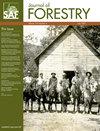Trees and forests’ contribution to well-being during the COVID-19 pandemic in England: how did people adapt to change?
IF 3.2
2区 农林科学
Q1 FORESTRY
引用次数: 0
Abstract
Abstract COVID-19 was declared a global pandemic on 11 March 2020 and has meant entire populations have experienced a significant change in lifestyle. Restrictions in England occurred through a series of phases from a lockdown through to the opening of shops and facilities. The initial restrictions led to a strong media focus on nature and getting outdoors for exercise and mental well-being. Alongside this but not related to COVID-19, there is a strong policy focus on forest creation and expansion in England with debate about where new forests might be created, what benefits they might provide, and to whom. In this research, we explored, for those with an existing interest in nature, whether this connection to nature and specifically to trees and forests could support people in coping with the restrictions they faced during the pandemic. We carried out an online survey in England in June/July 2020 and received 3333 qualitative comments. We then carried out 25 follow-up interviews in August/September 2020 with a sample of those who had completed the survey. We use the Kübler-Ross change curve as a lens to explore people’s reactions and responses to the significant changes brought about by the COVID-19 crisis, with a focus on their experiences relating to trees and forests. The results highlight that some people did move through the four stages of change outlined in the Kübler-Ross framework, although not always in a linear process, from shock and denial, to resistance, to exploration, and adaptation. The change curve model proved useful in this study but also had some limitations. Engagement with forests supported some adaptation as well as exploration through people undertaking new activities, visiting local spaces, and spending more time outdoors with their children. We also found that the benefits of engaging with trees and forests could help to support people’s well-being in times of high anxiety. The study highlights the importance of trees and forests as part of people’s lives, and the role they can play in supporting them when faced with major challenges.在英格兰COVID-19大流行期间,树木和森林对福祉的贡献:人们如何适应变化?
2019冠状病毒病于2020年3月11日被宣布为全球大流行,这意味着所有人的生活方式都发生了重大变化。英国的限制措施经历了从封锁到商店和设施开放的一系列阶段。最初的限制导致媒体强烈关注自然和户外运动和精神健康。除此之外(但与COVID-19无关),英格兰的政策重点是森林的创造和扩张,并就可以在哪里创造新森林、它们可以提供什么好处以及为谁提供好处进行了辩论。在这项研究中,我们为那些对自然有兴趣的人探索了这种与自然,特别是与树木和森林的联系是否可以帮助人们应对大流行期间面临的限制。我们于2020年6月/ 7月在英国开展了一项在线调查,收到了3333条定性评论。然后,我们在2020年8月/ 9月对完成调查的人进行了25次后续访谈。我们以k bler- ross变化曲线为视角,探讨人们对COVID-19危机带来的重大变化的反应和应对,重点关注他们与树木和森林有关的经历。研究结果强调,有些人确实经历了k勒-罗斯框架中概述的四个变化阶段,尽管并不总是线性过程,从震惊和否认,到抵制,到探索和适应。变化曲线模型在本研究中被证明是有用的,但也有一定的局限性。通过人们开展新的活动、参观当地空间以及与孩子一起在户外度过更多时间,与森林的接触支持了一些适应和探索。我们还发现,与树木和森林接触的好处可以帮助人们在高度焦虑时保持健康。该研究强调了树木和森林作为人们生活的一部分的重要性,以及它们在面临重大挑战时可以发挥的支持作用。
本文章由计算机程序翻译,如有差异,请以英文原文为准。
求助全文
约1分钟内获得全文
求助全文
来源期刊

Forestry
农林科学-林学
CiteScore
6.70
自引率
7.10%
发文量
47
审稿时长
12-24 weeks
期刊介绍:
The journal is inclusive of all subjects, geographical zones and study locations, including trees in urban environments, plantations and natural forests. We welcome papers that consider economic, environmental and social factors and, in particular, studies that take an integrated approach to sustainable management. In considering suitability for publication, attention is given to the originality of contributions and their likely impact on policy and practice, as well as their contribution to the development of knowledge.
Special Issues - each year one edition of Forestry will be a Special Issue and will focus on one subject in detail; this will usually be by publication of the proceedings of an international meeting.
 求助内容:
求助内容: 应助结果提醒方式:
应助结果提醒方式:


